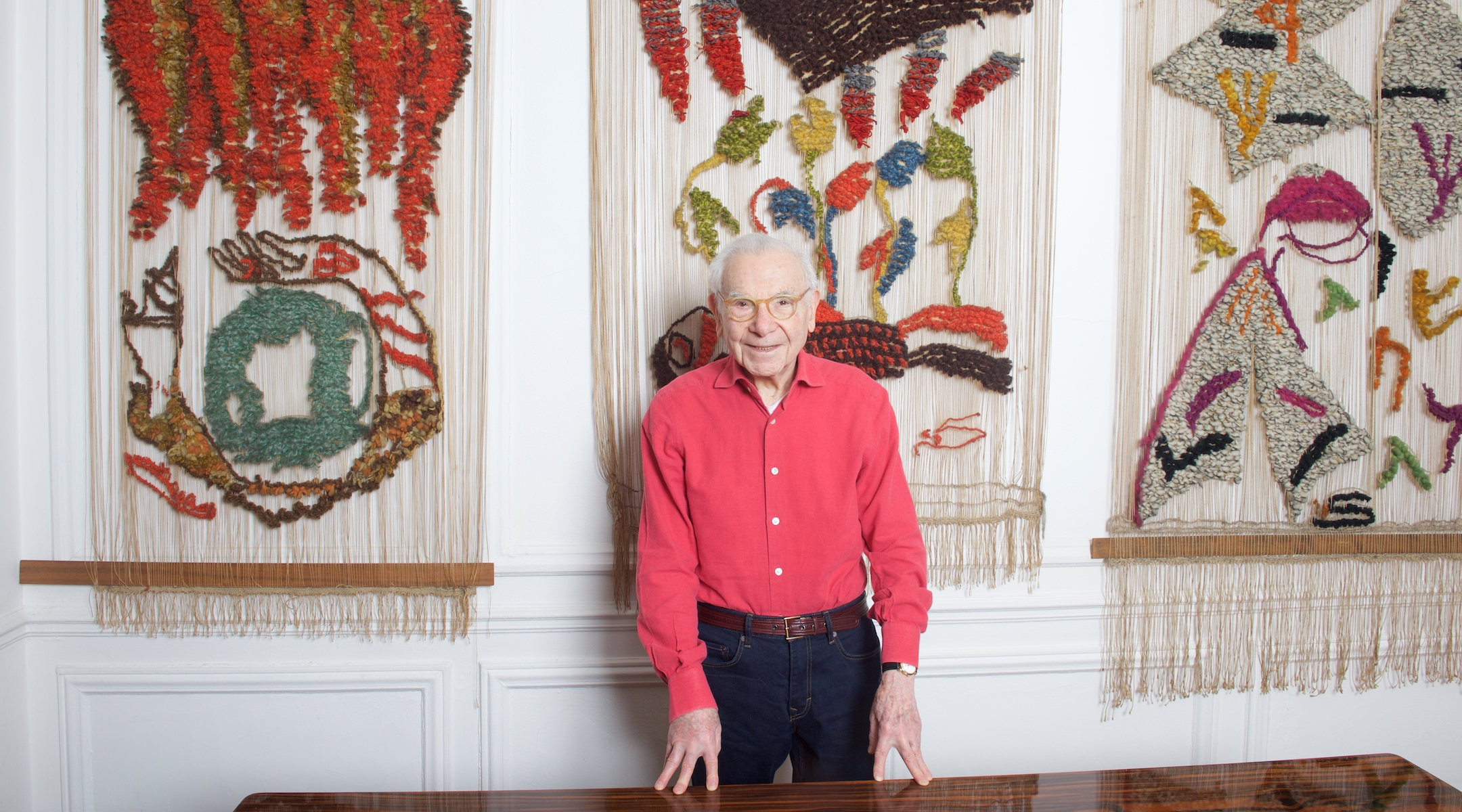(New York Jewish Week) — Just minutes after entering Ted Comet’s grand Upper West Side home for the first time, the tour begins: not of the large, high-ceilinged apartment filled with vibrantly colored rugs, paintings and sculptures, but of the five six-foot tall, vegetable-dyed wool tapestries, hung in the entry foyer and living room.
They were woven on a loom by Comet’s late wife Shoshana close to 60 years ago, and tell the story of the trauma she endured as a Jewish teenager fleeing Belgium during World War II and in the years beyond.
Comet, who turns 100 on Thursday, has played leading roles in Jewish communal organizations like the Joint Distribution Committee, American Zionist Youth Foundation and the Council of Jewish Federations for more than 75 years. He is the co-founder, in 1965, of New York’s Salute to Israel Parade. (This year’s parade, renamed “Israel Day on Fifth,” will take place on June 2, and Comet will be an honorary grand marshal). In the 1960s, he helped organize some of the first large demonstrations in support of Soviet Jewry. He’s also the founder of the annual Israel Folk Dance Festival, which recently celebrated its 73rd year.
But even as friends and colleagues prepare to celebrate his centennial, Comet is channeling much of his energy into his role as the keeper of Shoshana’s flame. His late wife was a Holocaust survivor whose family crisscrossed France, Portugal and Spain before arriving in New York in 1941. She was in her 40s and married to Ted when she first learned to weave, and after she completed the five tapestries, she walked away from her loom, never to weave again. She returned to school, eventually training as a psychotherapist who worked with Holocaust survivors and their families. She died in 2012 when she was 87.
Comet conducts tours of her work in person and over Zoom, talking about her theories about the transmutation of trauma and spreading her message of hope and resilience.
“My wife’s thesis is that the Jewish people [were not allowed to] make it on the military field so they chose another area and that was the mind. The intellect. Jews focused on the mind,” he said. “They took whatever trauma they had and transmuted it to creative energy.”
“Everybody has trauma,” Comet continued. “Trauma is built into the human condition. The challenge for everybody is do we let it master us or do we master trauma. That was Shoshana’s major point.”
“When Shoshana died, I took the trauma [of her death], and I transmuted it to these community tours.”
Comet’s belief in the transmutational power of trauma has informed his thinking since what he describes as “the volcano of Oct. 7,” when Hamas killed 1,200 people in Israel and kidnapped hundreds more.

Students from the Hebrew Public charter school network march in the Celebrate Israel parade — which was co-founded by Comet in 1965 — in New York City, June 4, 2023. (Philissa Cramer)
“We have more resilience than we think we do, as a people as well as individuals,” Comet said. “As far as Israelis are concerned, I would hope that Shoshana’s thesis would be applied here — that this trauma can be transmuted into some positive change in Israel. That is my hope. There are a lot of people ready for that change. There are a lot of people who are not.”
He is a critic of Benjamin Netanyahu, Israel’s prime minister, whom he considers inept and beholden to religious radicals. “Lord Acton says power corrupts and absolute power corrupts absolutely,” he said. “That is what happened with Netanyahu.”
And yet, he acknowledges, “everything is in flux. What we have today may be very different from a year from now. The things I worry about are Israel becoming a pariah state. All my life, Israel has been a source of inspiration for me.”
Comet is no stranger to trauma. Growing up in Cleveland, he was 4 when his 22-year-old brother, who was like a second father to him, died, and 11 when his father died suddenly. In 1946, when he was finishing his studies towards the chaplaincy at Yeshiva University in New York, Comet, then 22, volunteered to serve as a counselor in a Jewish children’s orphan home in Versailles, France funded by the Joint Distribution Committee. The children were survivors of Auschwitz.
It was there that he met and befriended a shy, 18-year-old teenager named Elie Wiesel, a relationship that lasted until Wiesel died in 2016. In the summer following his arrival in France, Comet went to the Pyrenees to establish a camp for the children.
“It changed my life in two ways,” he said. “One was that I didn’t know the horrors of the Holocaust [until then], on the downside. On the upside, I was stunned by the ability of these orphans to respond to love, to care and to concern. I realized you can make a difference.”
That set him on a trajectory devoted to the Jewish people and fostering a relationship between Jews and the State of Israel. He returned to the United States at the end of 1947, got a master’s degree in social work from Yeshiva University and was hired as the director of the Brooklyn Zionist Youth Foundation, an affiliate of the Zionist youth group Young Judaea. He was there from 1948-1952, when he became the director of Congregation Kehilath Jeshurun, on Manhattan’s Upper East Side, followed by leadership positions at the American Zionist Youth Foundation, Council of Jewish Federations, Joint Distribution Committee and the World Council of Jewish Communal Service.
For many people in the Jewish communal world, Comet remains a source of endless inspiration, a leader with whom John Ruskay, former CEO of UJA-Federation, still speaks regularly.
“He and I go back to 1965,” Ruskay said. “He introduced me to Ben-Gurion when I was a 19-year-old officer at United Synagogue Youth. Ted and I share a lifetime. He is the provost of the field” of Jewish communal service.
To mark his centennial, many people and institutions are feteing what UJA is calling “A Century of Ted” — their title for a birthday celebration in June at their headquarters. His apartment building on West 86th Street, where he has lived since 1968, is holding a party for him. His synagogue, The Jewish Center on West 86th Street, which he joined the same year he moved to his apartment, is celebrating him at the beginning of June. The Joint Distribution Committee sent a film crew to interview him and will screen the interview at their next board meeting in June.
Despite all the celebration, Comet tries to keep the focus on Shoshana’s tapestries. Shortly after a visit from the New York Jewish Week, he loaned the collection to the Yeshiva University Museum at the Center for Jewish History on West 16th Street, where they will be on display through Sept. 29.
Giving up the tapestries for the YU Museum exhibit was a hard transition for Comet.
“Depression is the word,” said Comet, who replaced the originals with high-quality photographs. “I feel like when you marry off a child: You are happy, on the other hand you feel a loss.”

Participants marching at the Celebrate Israel Parade in New York in June 2011. (Courtesy Celebrate Israel)
The museum is planning a celebration of Shoshana’s work and Ted’s life in June. Comet is looking for a permanent home for the tapestries for “when I’m gone,” he said.
He is adamant that a Holocaust museum is not where they belong. “Unless you are Picasso,” he said, “they will be put in the basement.”
From assisting young Holocaust survivors to building Jewish institutions to celebrating Israel on the streets of New York, Comet says the through line of his career has been building Jewish community. At the center of that enterprise is Israel.
“Except for the haredim,” said Comet, referring to fervently Orthodox Jews, “I don’t see how Jewish life can be sustained without Israel. To me, here’s a miracle. We finish Passover. For 2,000 years you wish for something and it happened in our lifetime. How could you not be amazed by that? To me it is stunning. Whatever differences you have, don’t lose sight of that.”
As for reaching 100, Comet quotes a French movie he saw in 1947, while he was helping French orphans as a young man. In it, the film’s protagonist was asked why, on his deathbed, he looked so troubled despite all that he had achieved. “What is it that you want?” he was asked.
The character’s dying words resonate with Comet all these years later.
“Toujours de plus,” he said. “Always more.”
The New York Jewish Week brings you the stories behind the headlines, keeping you connected to Jewish life in New York. Help sustain the reporting you trust by donating today.





